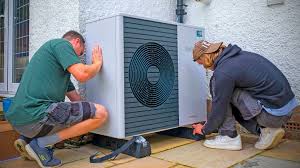Heat pumps are increasingly gaining popularity as a reliable and sustainable alternative to traditional heating and cooling systems. They function by transferring heat instead of producing it, which makes them a green option to ensure warm indoor temperatures all year round.
What Is a Heat Pump?
A heat pump (tepelné čerpadlo) is a device which transfers heat from one location to another. It consists of an outdoor unit and an indoor unit that is connected via refrigerant lines. The system is powered by a refrigerant that absorbs and releases heat as it circulates throughout the system. In winter, it draws heat from outside air (even even when the temperature is cold) and transfers it inside to keep your home warm. In summer, the process is reversed as the pump takes heat from inside and expels it out, thereby cooling your house.
Types of Heat Pumps
Air Source Heat Pumps (ASHPs) They are the most common and work by exchanging heat with the air outside. They are further subdivided into:
Heating devices that transfer heat between the air outside and inside.
Heating pumps that transfer heat into water in an hydronic system. This then heats your home via radiators or underfloor heating.
Ground Source Heat Pumps (GSHPs): Also known as geothermal heat pump, these systems are able to exchange heat with the ground. They tend to be better than air source heat pumps because the temperatures of the ground are fairly constant throughout the year.
Water source heat pumps: These make use of water from a lake or river as the medium for exchange of heat. They are less common however they can be extremely efficient in the event that you have a suitable water source near.
Benefits of Heat Pumps
Energy Efficiency: Heat pumps can provide three times more heating power to a house than the electricity they consume. This can lead to significant savings on energy bills when compared to conventional heating systems.
The environmental impact: Through reducing dependence upon fossil fuels, pumps can help lower carbon emissions, making them a greener choice for cooling and heating.
Flexibility: Heat pumps offer both cooling and heating options that make them a flexible option for year-round comfort.
Durability: If properly maintained the heat pump can last between 15 and 20 years. This is more than the majority of traditional heating and cooling systems.
Considerations
Initial cost: Heat pumps can have more upfront costs in comparison to conventional systems. However, this is usually offset with lower operational costs and potential government incentives.
Efficiency in Extreme Temperatures: While modern heat pumps work well in a wide temperature range however, their effectiveness may be reduced when temperatures are extremely cold. It’s important to choose a system suited to the local climate.
In summary the heat pumps are an investment that is beneficial for energy efficiency and environmental sustainability. They can provide cooling and heating, coupled with long-term savings and a smaller carbon footprint, make them an appealing alternative for modern homes.



